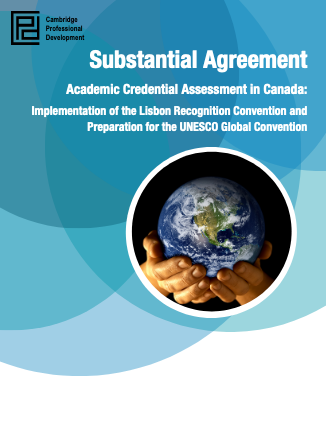International consultation procedure with Member States
Beginning in 2012, in collaboration with its Member States, UNESCO undertook extensive consultations to gather comments and suggested amendments on the draft version of the Global Convention. This process led to its adoption by Member States in November 2019. Throughout this process, federal, provincial, and territorial governments participated in consultations with the international community and the drafting process, in order to ensure Canada's position was represented, particularly with respect to the following:
- the constitutional responsibility for education conferred on Canada's provinces and territories; and
- respect for the autonomy of postsecondary educational institutions and professional regulatory bodies in Canada.
Domestic consultation procedure within Canada
In 2018, CICIC led consultations with assessment services and competent recognition bodies in Canada on the Global Convention. Using data collected, CamProf Inc. subsequently provided a comprehensive data analysis on Canada's implementation of all provisions of the 1997 Lisbon Recognition Convention undertaken by assessment services and competent recognition bodies in Canada, but also Canada's readiness to implement provisions of the Global Convention. It is also important to consider that these assessment services and competent recognition bodies maintain broad autonomy in recognizing academic credentials in accordance with their respective legislated autonomy.
 In 2020, the independent report authored by CamProf Inc. and titled Substantial Agreement – Academic Credential Assessment in Canada: Implementation of the Lisbon Recognition Convention and Preparation for the UNESCO Global Convention was published. Although this analysis does not necessarily reflect the official policies, positions, or views of CICIC, CMEC, provincial and territorial governments in Canada, or assessment services and competent recognition bodies in Canada, it does provide useful insight into the implementation of conventions related to qualification recognition in Canada.
In 2020, the independent report authored by CamProf Inc. and titled Substantial Agreement – Academic Credential Assessment in Canada: Implementation of the Lisbon Recognition Convention and Preparation for the UNESCO Global Convention was published. Although this analysis does not necessarily reflect the official policies, positions, or views of CICIC, CMEC, provincial and territorial governments in Canada, or assessment services and competent recognition bodies in Canada, it does provide useful insight into the implementation of conventions related to qualification recognition in Canada.
The major next steps for Canada's provincial and territorial governments are to:
- confirm the implementation of the provisions of the Global Convention;
- reach a consensus on the agreement to ratify the Global Convention, in order to notify Global Affairs Canada, which is responsible for initiating the administrative procedure for having Canada ratify an international treaty; and
- prepare the declaration that will accompany Canada's ratification instrument, in order to provide specifics about the convention's implementation in Canada.
CMEC continues to collaborate with all interested parties to finalize preparatory steps for a possible ratification of the Global Convention.
Get an overview of the Global Convention, and consult the FAQ.
Furthermore, UNESCO published a practical guide to provide a step-by step approach to recognition of foreign qualifications in line with the provisions of the Global Convention, both for credential evaluation practitioners and for individuals seeking recognition of their foreign qualifications.